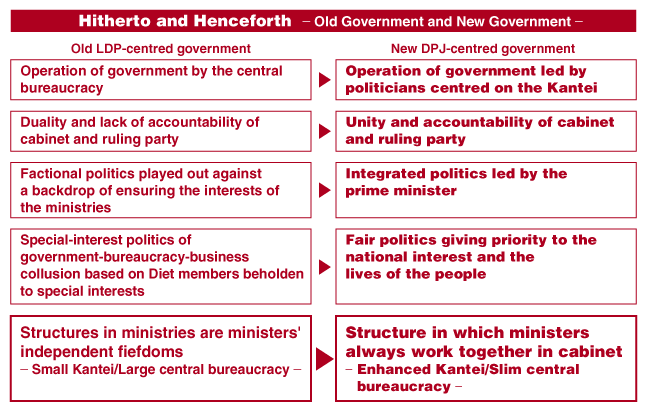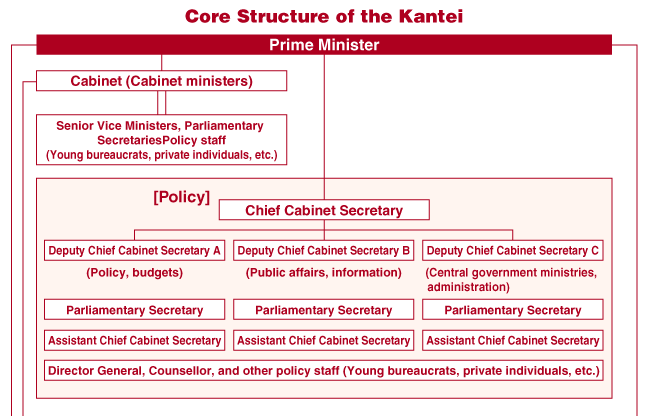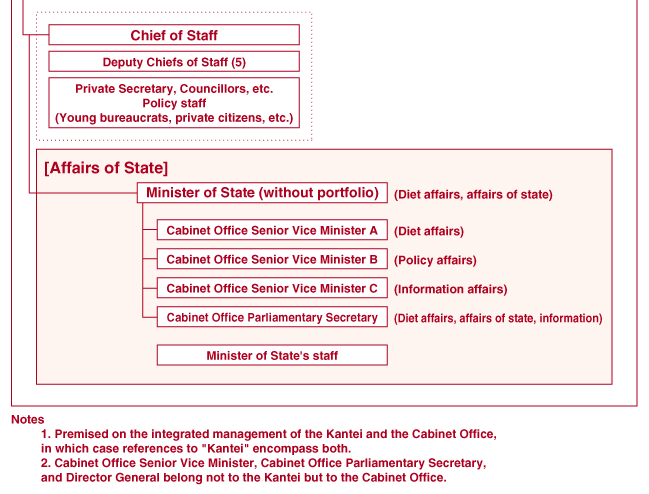 |
 |

If the government doesn't change, politics and policies won't change.
Despite the Koizumi cabinet's showy performance, the fact is that reform is being put off again and again. No matter how superior the DPJ's manifesto is, decisive action on reform would be difficult unless there is strong will to accomplish it, and a mechanism through which the cabinet pulls fully together to implement it. What is needed now is not words, but the dynamism and strength to change politics. There is an urgent need to establish a new government equipped with the power and the mechanisms to translate a reform plan into reality.
Why is that impossible with the LDP? The fundamental reason is the dual structure of power: the dual structure of the cabinet and ruling party; the dual structure of the prime minister and individual ministers; and the perverseness of the politicians and bureaucrats, and the bureaucracy-led management of policy. What emanates from the political side is just official verbiage, while the reality is that control is exercised by Diet members beholden to special interests and former senior bureaucrats who have received golden parachutes; this dual structure preserves old-style politics.
The new government the DPJ aims to create will be
1. A government that introduces a do-shu system, or a system of states, and transfers sources of tax revenue to the regions, that is resolute in entrusting to the private sector, the regions, and the citizens' sector the matters that should be entrusted to them, and that ensures "small government" at the centre, and
2. A government that eradicates the dual structure of power in the administration and establishes a tenacious cabinet that, with respect to issues that should be dealt with by the state, makes policy decisions more quickly and more resolutely, and clarifies where responsibility lies. |
 |
We will create a government that pursues the national interest and eradicates the self-interest of the bureaucracy, ministries, and bureaus.
The DPJ cabinet will take policy decisions on national strategy, including the framework of budgetary and tax-system reform, basic foreign policy, the desired way in which the reform of education and social security should progress, and strategy for industry and technology, not by relying solely on the central bureaucracy in Tokyo, but on a politically led basis in the national interest.
- In carrying this out, the cabinet will be joined not only by the chair of the Policy Research Committee, who is responsible for party policy, but also by the party secretary general, who has responsibility for party administration, enabling the government and the ruling party to tackle reform resolutely in a unified manner.
- The prime minister, chief cabinet secretary, and senior cabinet ministers such as the foreign minister and finance minister, together with their policy staff, will be based permanently at the prime minister's official residence (the Kantei). The prime minister and the cabinet will decide policy on the basis of the national interest, giving priority to relationships of trust between the prime minister and each individual cabinet minister, rather than on relations with the bureaucrats at each ministry.
- Basic policy planning will be conducted primarily by cabinet ministers and their policy staff at the Kantei and each minister's secretariat, while the central government bureaucrats will dedicate themselves to practical administration and policy execution in accordance with basic policy. |

|
 |
We will work with people of all kinds who support and sympathise with this Manifesto (statement of administration policies)
The significance of this Manifesto (statement of administration policies) lies not in its words and phrases, but in its implementation. In order to accomplish this it will be essential to gather together highly able people who support and sympathise with the policies of the DPJ and are committed to working assiduously for the national interest, and under the guidance of the prime minister and cabinet ministers, to throw our combined energies into implementing reform resolutely.
- We will change the conventional seniority-based personnel practices at the heart of the bureaucracy, forming a Kantei policy team comprising young bureaucrats, private individuals, academics, and others who are competent and brimming with enthusiasm for reform, irrespective of age, gender, or background. Some places on the team will be filled by making a public appeal for applicants.
- In the ministerial secretariat in each ministry (actually positioned close to the Kantei) we will establish policy-drafting teams composed of reform-minded bureaucrats and private individuals of any age; each will be under the direct control of the minister. In this way we will create a structure to supplement ministers' political leadership, without being bound to the interests of a particular ministry bureau.
- Of course it will also be necessary to have the cooperation of the bureaucrats in each ministry. We will build a structure for realising political leadership by requiring officials of the level of administrative vice-minister and bureau director-general to extend their full cooperation to the DPJ's basic policies, including its administration policies, and appointing those who pledge their cooperation.
- As additional steps to secure the structure described above, we will increase the number of special-service officials under the National Public Service Law, and ease the Diet Law restrictions on concurrent employment by members of the Diet. |
|
|
Through a top-down approach we aim to achieve bolder and swifter policy-making.
We will implement a radical reform of Japan's policy-making process, over which ministries and agencies at present effectively hold veto powers, and which is burdened by very slow, half-baked decision-making.
To achieve that
- We will abolish the mechanism, symbolised by meetings of administrative vice-ministers, of advance manipulation of the cabinet's agenda, and change it to a politically led mechanism of top-down decision-making centered on cabinet meetings and meetings of senior vice ministers.
- We will introduce decision-making by majority vote into the process of reaching agreement at cabinet meetings, instead of requiring unanimous agreement on all items. We will also adopt a mechanism for stimulating the making of essentially political decisions through the flexible establishment and management of consultative meetings of related cabinet ministers.
- We will objectively evaluate and discard old politics and policies. To remedy the waste caused by previous administrations, under the strong leadership of the prime minister and cabinet ministers, shortlists of priority reforms will be drawn up for each ministry, and implemented within certain time limits. Also, during our term of office we will establish in the Diet an administrative oversight office (the Japanese equivalent of the General Accounting Office in the U.S.), introducing a mechanism for constant objective assessment and examination of policy and government business.
- We will reform the process for formulating budgets and revising the tax system. We will not simply place everything into the hands of the Ministry of Finance and other central ministries, but establish a cabinet finance bureau, make bold changes to budget allocations in a way that transcends the interests of individual ministries, and proceed with a radical reform of the tax system. Simultaneously with that we will restore soundness to public finances by reforming the public accounting system, exposing hidden debts, and casting light on the cost-effectiveness of public finance |
To establish a new government led by the prime minister and the cabinet, immediately after gaining power we will implement reform resolutely in fixed stages.
Upon taking over the reins of government we will pursue reform rapidly and relentlessly in the following stages.
1. Start of administration (1st & 2nd stages)
2. Clear cleanup of the political system (Plan to dismantle the structure of special interests) (3rd stage)
3. Implementation of full-scale reform programme (Japan Revival Plan) (4th stage) |
| Establishment of administration and evolution of new government: Four Stages |
 |
1st Stage
First five days after assuming power |
 |
|
Immediately after gaining power we will create the core structure of the new government.
Under the person to be appointed prime minister (the party leader) we will establish a team to take charge of policy, composed of the persons to be appointed Chief Cabinet Secretary (chair of the party Policy Research Committee), Deputy Chief Cabinet Secretaries (3, in charge of policy, information, central government ministries), and Deputy Chiefs of Staff (5, under the Chief of Staff), and also a team to take charge of Diet affairs and affairs of state, headed by a minister of state without portfolio (party secretary general, with responsibility for affairs of state). The prospective prime minister will quickly nominate a number of persons to hold key ministerial posts, and by combining them with the two teams will establish what will effectively be the Kantei-cabinet team.
This team will carry out the verification of fundamental policies based on our administration policies, and will determine the basic policies for rapid and decisive policy-making, including by abolishing the meetings of administrative vice-ministers and establishing meetings of senior vice-ministers, and by revising the management of cabinet meetings. |
|
縲? |
 |
| Period of cabinet formation |
 |
|
|
 |
 |
| Action in the 5-day preparation period for the administration |
 |
|
 |
1. Establish what will effectively be the Kantei-cabinet team (including nomination of persons to hold key ministerial posts)
2. Determine personnel policy for the cabinet
3. Verification of basic policies
4. Formulation of policy for the conduct of the administration |
 |
|
|
 |
 |
2nd Stage
Formal inauguration of administration, within 30 days |
 |
|
Within the first 30 days after gaining power we will complete the basic framework for the conduct of the administration by the new government.
During this period the prospective prime minister and others will prepare the draft of the prime minister's keynote policy speech at the opening of the Diet session, draw up basic policy for the drafting of budgets, nominate all prospective cabinet ministers and senior vice-ministers, and draw up drafts of a 100-day reform plan and a 300-day reform plan.
At the first cabinet meeting after the appointment of the prime minister, the basic policy for the
operation of the cabinet will be presented, officials at the level of vice-minister and bureau director-
general in all ministries will be required to cooperate with it, and only those who cooperate will be appointed. Reform-minded bureaucrats, private individuals, and other persons, irrespective of age, will be appointed to the policy staff in the new Kantei and ministers' secretariats. |
|
縲? |
 |
| Period of planning the activities of the new administration |
 |
|
|
 |
 |
| Effective start of the new cabinet |
 |
|
 |
1. Strategic approach to extraordinary and special Diet sessions
2. Formulation of draft of prime minister's general policy speech to the Diet
3. Drafting of 100-day and 300-day reform plans
4. Appointment of prime minister and formation of cabinet; at first cabinet meeting, presentation of basic policy for the operation of the cabinet
5. Recruitment and appointment of Kantei policy staff |
 |
|
|
| Notes |
1. In the 5-day period of the 1st stage, the final decisions will be taken on the core political staff who will move to the Kantei, and the list of cabinet ministers.
2. In the 2nd stage, decisions will effectively be taken on the assignment of personnel, including of
aides at the Kantei and to form the staffs of ministers at their ministries.
3. The prime minister's general policy speech to the Diet will include policy for the drafting of budgets, and the key points of the 100-day reform. |
 |
 |
3rd Stage
After forming the administration,
100 days of reform |
 |
|
Immediately after the formation of the new administration, it will present to the people a 100-day reform plan that will incorporate the maximum number of issues in which reforms can be carried out under
current laws. In particular, for each ministry a list of approximately five priority reforms will be issued with respect to the habitual carrying-out of public works through the collusion between politicians, bureaucrats, and big business, and the reforms will have to be pushed through within certain time limits under the leadership of the ministers. In order to support ministers we will institute a policy-evaluation council headed by private citizens or politicians and composed of reform-minded bureaucrats, private citizens, and others. It will be convened for a short period to concentrate on re-examining conventional administrative practices, in part by sounding out the views of ordinary people.
During this period, key ministers
(senior vice-ministers, parliamentary secretaries, and core policy staff from individual ministries) will be stationed permanently in the Kantei. Also, to increase appointments from outside we will initiate a study to ease restrictions on concurrent employment by members of the Diet, and to amend the system to increase the number of special-service officials. |
|
縲? |
 |
Period of full-scale start of
the new administration |
 |
|
|
 |
 |
Distinct cleanup of the political system
(Plan to dismantle the structure of
special interests) |
 |
|
 |
1. Prime minister's general policy speech to the Diet
2. Compilation of the 2004 fiscal year budget bill
3. Presentation and implementation of 100-day reform plan
(Elimination of old-style policies and projects)
4. Establishment of policy-evaluation council
5. Effective permanent placing of the prime minister and key ministers in the Kantei, and full-scale start of activities of the Kantei-cabinet policy staff team
6. Strategic arrangement of budgetary and legal matters |
 |
|
|
 |
 |
4th Stage
300 days of reform |
 |
|
Based on the results of the 100-day reform plan, the findings of the policy-evaluation council, and the party's administration policies, a 300-day reform plan will be unveiled. This will include a full-fledged budget bill, and bills to amend laws for the purpose of changing systems.
The principal focus will be on addressing specifically the domestic and foreign-policy issues set out in the administration policies. In addition, a start will be made on implementing cabinet-led fiscal reform by such means as the establishment of the cabinet finance bureau and reform of the public accounting system; the reform of the civil-service system in order to prohibit the institutionalized giving of golden parachutes to retiring senior bureaucrats and to facilitate the appointment of people from outside the bureaucracy; the development of think tanks as institutions to employ outside personnel; and the revision of the Cabinet Law and the National Government Organization Law.
Steps will also be taken to perform an ongoing review of wasteful policies and government projects, and to re-focus the values of the administrative authorities towards ordinary citizens in their daily lives. To that end, a bill will be prepared for the establishment in the Diet of an administrative oversight office
(Japanese equivalent of the U.S. General Accounting Office). |
|
縲? |
 |
Period of accelerated reform by the
new administration |
 |
|
|
 |
 |
| Implementation of full-scale reform programme (Japan Revival Plan) |
 |
|
 |
1. Presentation and implementation of 300-day reform plan to address key domestic and foreign-policy issues, to include an annual budget bill and the reform of laws.
2. Implementation of cabinet-led fiscal reform
- Establishment of cabinet finance bureau
- Start of reform of the public accounting system
- Formulation of medium-term fiscal-reform plan
3. Full-scale administrative reform by the revision of the Cabinet Law, National Government Organization Law, and National Public Service Law
4. Drafting of bill for the establishment of an administrative oversight office in the Diet
5.Development of policy think tanks |
 |
|
|
|

